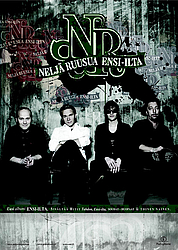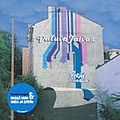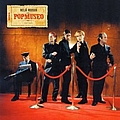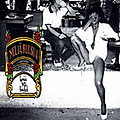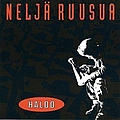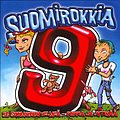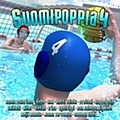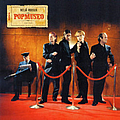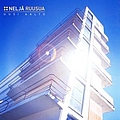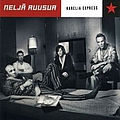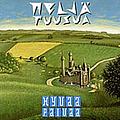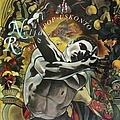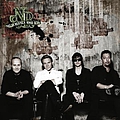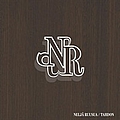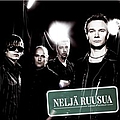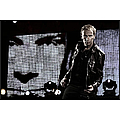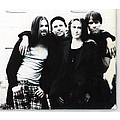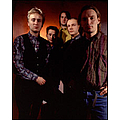Биография Neljä Ruusua
www.myspace.com/neljaruusua www.youtube.com/neljaruusua Neljä Ruusua is a Finnish rock-band founded in 1982 in Joensuu as Talouskukkaro. They went on to record 11 albums under the name Neljä Ruusua and two in English as 4R between the years 1987 and 2006. In 2007 they went on an indefinite hiatus. And Talouskukkaro - founded 1982 in Joensuu - had merely a cult status in the history of Finnish rock music in spite of getting through to the final of the Finnish Rock Championships in 1983. Among the contemporaries the band - in "Lollipops speed" - stirred feelings of emotional astonishment, though. The band did represent somewhat too youthful breaths of air in the era of blackish and over-romantic Finnish rock: pre-adolescent primitive force the existence of which was recognized by everyone but not always accepted, at least not from a band consisting mostly of players at the mature age of 14. The four novices in the realm of rock music Ilkka Alanko , Kode Koistinen, Lade Laakkonen and Kämy) did, however, wake that much attention that the change of name into Neljä Ruusua couldn't shake off those who already had lost their hearts to the band. A year later in 1986 Neljä Ruusua signed by a major record label and in 1987 the first album Nelja Ruusua was released. Even though the band had now worked for five long years it was just the beginning. The first album was received with something that can be described 'polite interest'. The next album Kasvukipuja was released later the same year and a minor hit Itkupilli included in the album seemed to convince the listeners of Neljä Ruusua having the stuff for great achievements later on. Today the two albums seem to be twins brimming over with desire to prove their potential. At that time Neljä Ruusua did quite a few unplugged gigs and it was then the rhythmic disco-influenced groove was introduced to the public - the sound that was to be the trademark of the band. It took two years before the next album was released. The album Hyvää päivää, 1989, was a good step towards what the band was to be in the 90's. Even though the music in itself was not yet clearly the Neljä Ruusua of today the tracks distinctly were. At that stage it was still Ilkka Alanko who mainly answered for composing - the days of guitarist Koistinen came somewhat later - the unique sound of the band began to take shape. Neljä Ruusua continued doing gigs and the sign SOLD OUT was not a rare sight on the door of the venue. The fourth album Hyvää yötä Bangkok harvested what Neljä Ruusua had sown on their three previous albums. The interest in new technology the band had nurtured together with their almost headstrong desire to play rock. "Hyvää yötä Bangkok" sold gold and e.g. the readers of Rumba voted with nearly moving unanimity both the band, the album and the piece called Sukellus number one of the year in their respective series. Among top 15 pieces were also two more "Hyvää yötä Bangkok" tracks, Muisto and Bangkok. This proves that Neljä Ruusua earlier known for their gigs had now succeeded in creating a few two minute hits in addition. It was about that time the band started to emphasize the visual contents of live performances. They slaved away touring and the hard work paid - gigs SOLD OUT were now rather the rule than exception. Haloo, 1992, continued on the same commercial metal line as the previous albums only selling platinum instead of gold. Several tracks on the album like Juppihippipunkkari, Tie Ajatuksiin or Sun Täytyy Mennä are nowadays seen as classical reflections of their time. Neljä Ruusua continued on their musical journey deeper and deeper into the borderland of dancable pop and devotional rock - an area that was still pretty much undefined in Finland. While the identity of the band got clearer the critics had to look for comparision outside the Finnish borders. It was not uncommon to hear Neljä Ruusua mentioned in connection with names like Prince, U2 and Depeche Mode. The next album Pop-uskonto, released in 1993, sold also platinum and continued the success of "Haloo" in the votings arranged by different operators in music business - Neljä Ruusua kept its pole position in both series, band and album. It might be mentioned that Ilkka Alanko was voted number one sex object of the country, which can, in a way, be considered a break into a new area! The tracks Poplaulajan Vapaapäivä and Luen were the figureheads of the album. The band spread pop-religion on a massive tour by Finnish standards - the tour lasted 38 days including only one day off for the band. The highlights of the year 1994 were joint performances with the city orchestra in Joensuu, Turku and Tampere. The performance in Tampere was recorded and the double CD with a remix collection titled "Energiaa" sold gold. Also the legendary gig in Ilosaarirock took place the same year: the band had to cancel the gig due to a heavy thunderstorm but compensated it a couple of weeks later throwing a gig that tested the island's ability to float! In 1995 the band planned, together with a group of nine dancers led by coreographer Ari Numminen, a Midsummer night show called "Tanssienergismi" - the show was performed on five different festivals in three days. After that the parallel project 4R was activated and Neljä Ruusua set aside. 4R meant, in the first place, a new motivation for the existence of the band that had achieved in Finland practically everything that there was to be achieved. 4R released two albums in English, the first of which Mood, 1996, sold gold. "Not For Sale", 1998, didn't do commercially as well and Neljä Ruusua, the media favourite in Finnish, now as 4R recording in English, was received by the media in a way no band in Finland has ever experienced: those who had been clapping on the back were now stabbing! The experience united the band more than anything else. It's even probable that without 4R Neljä Ruusua wouldn't exist - at least not as creative and inspired as it is today. As the millennium got closer the band in Finland took a risk again - it released an album in Finnish after a break of six years. Uusi aalto was released in September 1999 and the album rose immediately to the top of the sales list. And the listeners followed the beat of hits like Varjo, Hunningolla, Olen Niin Pop and Luotsivene! Soon after the release Neljä Ruusua resumed touring starting with the unplugged "Hunningolla Baareissa" followed soon afterwards by the actual "Uusi aalto" tour. In some respects the Neljä Ruusua of 1999 were identical to the Neljä Ruusua of earlier years but then again they had acquires new elements meanwhile. Neljä Ruusua 1999 were playing with music. The music in "Uusi aalto" was more experimental and varied, producer Illusion Rake, who was singled out from the world of dance pop, contributed to the change. The unique sound of Neljä Ruusua was still to be detected in the sound and lyrics - the former self-irony as well. Neljä Ruusua still used different music genres in an unconventional way and created combinations that were distinctly theirs. Even now their music was compared only to the previous albums of their own, not to anybody else's, which speaks its own language of the musical dimensions and the status of the band in Finnish rock scene. Towards the millennium Neljä Ruusua had done almost 40 "Uusi aalto" gigs, the fans were swarming around the band, gold disc for the seventh studio album was hanging on the wall and "Hunningolla" was chosen Pop Video of the Year in Jyrki Hit Awards. Neljä Ruusua started the new millennium by releasing the first collection of their career in October 2000. The double album titled Popmuseo included 30 greatest hits of the band among others "Juppihippipunkkari", "Hunningolla", "Sun täytyy mennä", "Olen niin pop", "Sukellus", "Tie ajatuksiin" and two new tracks, Popmuseo and Yön Yksinäinen. The collection was a commercial success. It topped the album chart the very week it was released and in three months it became the fourth best sold album of 2000 in Finland with 65 000 sold copies. The "Popmuseo" video contributed to the success - the album had meanwhile sold platinum - and, of course, the gigs: at first the unplugged "Hunningolla Baareissa" part two round and towards the end of the year the massive "Popmuseo" tour. Their next album, Valuva taivas, was released in November 2001. The opening single Missä vaan which the band had almost accidentally shown the record company became the summerhit of 2001. "Valuva taivas" was winged to the platinum club by a single titled likewise - the single brought into daylight the more serious side of this quartet of eastern Finnish origin. The band do consider Valuva taivas one of their best. The bonus release of the album including the instrumental Autere introduced until now unknown qualities in Neljä Ruusua. The limited bonus release of "Autere" was, of course, sold out much too soon. "Valuva taivas" attracted still extra attention in Helsinki. The cover picture of the album was painted - huge-sized - in the gable wall of a multistorey building as part of the cityscape - nowadays a new building conceals the painting. In 2001 the band performed on six Midsummer festivals and "Valuva taivas" tour which started in November 2001 and went on until August 2002 with singles Nuoli ja sydän and Yhtyneet as pacemakers. Publishing House Like contributed to the success of both the collection album and the album "Valuva taivas" by publishing the book "Suosituimmat". The book contains both history and music of Neljä Ruusua and is still available. Thanks to "Valuva taivas" Neljä Ruusua could after the tour stand back from the limelight for a while to enjoy their success. The quiet life for Neljä Ruusua ended in December 2003 as Popstars, a single with fast tempo and flashy lyrics, was released on radio waves. Neljä Ruusua aroused debate on a current issue and made their stand clear, in a sharp and self-ironic way, letting "Popstars" speak for themselves. On Friday 13.02.2004 Karelia Express, the ninth studio album of the band, was released. The album rocketed to the top of the official album chart in Finland and in a week a new gold disc was nailed next to the previouis ones. The track Elän vain kerran hit the charts in the beginning of February and sat tight on top still in May only to be replaced by another Neljä Ruusua single, Öisellä rannalla. The fourth and final single of the album, Veri was released in autumn 2004. At the end of February 2004 Neljä Ruusua started again a new set of gigs after one-and-a half-year break and 27.02.2004 they were let loose in the opening of Joensuun Areena. The audiences were carried away by Neljä Ruusua more than 90 times on the massive "Karelia Express" tour - afterwards the exhausted but happy popsingers settled down to have their well- earned rest in the countryside or under the southern sun. In 2005 Neljä Ruusua did no gigs which caused the band severe withdrawal symptoms - to patch the situation they did two curative gigs at Midsummer. In the autumn the band had the situation well in hand again as Ilkka, Kode, Lade and Kämy started the preparations for a new album. The new Neljä Ruusua music could be heard on radio waves in May 2006 as the album opener Soudat - huopaat, released only in digital form, entered the charts. And finally it was time for the gigs again! The summer tour 2006 started at Midsummer. Elämä Lapselle concert 14.09. was the live premiere of Tahdon, the second single on the album - the video premiere was shown on Voice TV 11.09.2006. The first performance of the Neljä Ruusua album titled Ensi-ilta took place on 04.10.2006. The familiar Neljä Ruusua elements, the voice of Ilkka Alanko setting the pace, are to be recognized on the album. Antti Eräkangas, the new publisher, who together with the band has grappled with the album on Dynasty Recording studio in Helsinki, has brought new musical elements to the Neljä Ruusua sound balancing on borderline of rock and pop. Soon after the release of the album on 13.10.2006 the tour was started.
Тексты популярных песен Neljä Ruusua
| Title | |
|---|---|
| 1 | Missä Vaan |
| 2 | Sun Täytyy Mennä |
| 3 | Juppihippipunkkari |
| 4 | Suikki |
| 5 | Valuva Taivas |
| 6 | Veri |
| 7 | Hunningolla |
| 8 | Luotsivene |
| 9 | Tie Ajatuksiin |
| 10 | Onnela |
Оставить комментарий
Что вы думаете об исполнителе Neljä Ruusua? Напишите ваш комментарий.
Альбомы Neljä Ruusua
Похожие исполнители
- Don HuonotRock
- Kolmas NainenPop/Rock
- Ismo AlankoPop/Rock
- HapporadioPop/Rock
- MiljoonasadePop/Rock
- DiscoElectronic/Pop
- MambaPop/Rock
